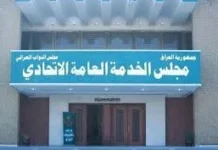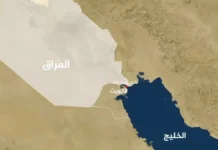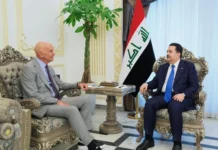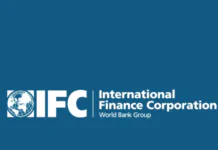Today, September 4, 2024, Parliamentary Member Haider Al-Salami confirmed the formation of a joint committee to select 80 Iraqi ambassadors from a list.
Al-Salami said in a press interview that “the State leader framed a joint council from the Service of International concerns notwithstanding three individuals from the Unfamiliar Relations Board of trustees in the Place of Delegates to consider the rundown of contender to take on the place of envoy.”
“The mechanism followed in selecting them includes a violation of the Foreign Service Law, specifically Article 9/Third, which emphasizes the appointment of ambassadors from outside the diplomatic corps by no more than 25%, while the current practice is 50% for the Ministry of Foreign Affairs and 50% for political forces,” he continued. “According to the information, Iraq needs about 80 ambassadors in different countries.”
He brought up that “the most common way of checking the designated names will take a few time and every one of the names presently being proposed are wrong,” focusing on that “the board is proceeding to play out its work in deciding the names as per a particular focuses rule as well as proposing save names for crisis cases, which is a system basically as per discretionary standards.”
Envoys of Iraq are strategic agents delegated by the Iraqi government to address the nation’s advantages in different nations or to worldwide associations. After being nominated by the Minister of Foreign Affairs and receiving approval from the Council of Ministers, ambassadors are appointed by the President of the Republic.
As the process of appointing ambassadors has become linked to a set of complex factors, including political quotas, the influence of political parties, and professional competence, the controversy over the appointment of Iraqi ambassadors reflects the political tensions and challenges that the Iraqi state has faced since 2003.
Over time, there have been calls to change the way ambassadors are chosen so that they are chosen solely on professional criteria and not on political quotas. Implementing clear and transparent criteria for selecting ambassadors and expanding the Ministry of Foreign Affairs’ involvement in the nomination and appointment process are two of the proposed reforms.
Political amount
Since the fall of the previous system in 2003, the most common way of naming representatives in Iraq has been dependent upon an arrangement of partisan and ethnic quantities, where conciliatory positions are split between different political and partisan parts. This has prompted the arrangement of certain diplomats in light of political or partisan affiliations, as opposed to capability and experience.
Professional competence The fact that the Iraqi ambassadorial appointment process prioritizes partisan loyalty over professional competence is one of the process’s most prominent criticisms. At times, people who need conciliatory experience or profound information on foreign relations are named to ambassadorial posts, bringing up issues about the capacity of these people to really address Iraq.
At last, the discussion over the arrangement of Iraqi representatives stays a mind boggling issue that mirrors the country’s inner political contentions and influences Iraq’s discretionary presentation on the global stage.





